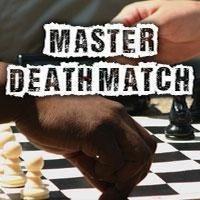
Agdestein Wins Final Game to Take Death Match 28
By virtue of winning a four minute and 15 second final bullet game, GM Simen Agdestein broke the deadlock to beat GM Giorgi Kascheishvili in Death Match 28 on Friday.
The final score of 12.5-11.5 was notable in many respects. The two played the second-fewest number of games in any Death Match (many games were decided in the final seconds). Also quite uncharacteristic was the lack of long streaks -- neither player won more than two games in a row, and no player ever had a lead more than two games.
Only three games out of the 24 ended in a draw.

Agdestein said before the match that he did not think preparing would be particularly useful.
"I think I learned a little bit when I played Blitz in Norway Chess," he said, referencing his deserved invite to this year's super tournament. "No one prepared there. I have a horrible memory anyway. Being fast is more important."
Kacheishvili practiced with his student and previous Death Match winner, GM Alex Lenderman. The two played blitz and bullet the day before the match; Kacheishvili had never played on the Chess.com live server before then.

"You have to be a fighter from the beginning," was his thinking. Both Lenderman and fellow student and Death Match winner GM Irina Krush had to overcome large deficits to win their matches.
Agdestein took a quick 2-0 lead in the opening 5+1 segment. Kacheishvili eventually caught up to even the blitz at 3.5-3.5, but not before this positional gem from the Norwegian in game four.
In fact, the first four games were all lost on time -- three by Kacheishvili and one by Agdestein. Then the players sped up, largely because they had to. Agdestein narrowly took the 3+1 portion by a score of 4-3.
In game nine, Black's active rook was all that mattered. Eventually the bishop joined the party and White couldn't parry all the threats.
The players rarely repeated openings, except for the Dutch, which Agdestein trotted out a handful of occasions.
Game 14, the final of the three-minute, swung like a pendulum. White stymied Black's d-pawn, then allowed a trick and was losing, then Black hung his extra piece. White had two extra and connected passers, which eventually translated into mutual queening with still two extra pawns, which still didn't win. When all was said and done, a draw seemed fair.
The two traded victories for nearly the entire bullet portion. Kacheishvili tied the match three different times, once checkmating Agdestein in two consecutive games.
Game 18 was particularly brutal.
After this, the player with the white pieces won the final six games, which ended the bullet in a 5-5 tie, thus giving the match to Agdestein, thanks to his win in the second segment.
It didn't seem like game 24 would be the final installment, but the 74-move 1+1 game essentially added more than two minutes via the increment. The 4:15 game concluded the match. Neither player was aware of the exact match clock, otherwise Kacheishvili might have resigned 30 moves prior to ensure a 25th game!

The conversion was just hard enough to make it seem Agdestein was running out the clock, which he said he was not. His long-winded technique was perfectly reasonable and given the match standings, the perfect way to play.
"The main problem for me is that I was too rusty," Kacheishvili said. "I felt it during the match. I could not put pieces of myself together."
Since he was mostly unfamiliar with Chess.com, he had not turned off his "friend request" notifications, which constantly appeared while he played. "But now you have new friends, so in a sense, I won!" he joked.
"He mated me a few times, which annoyed me a little bit," a bemused Agdestein said. "The whole format is quite funny. Anything can happen. It's kind of random but it must be fun watching."
Agdestein won $700 ($500 for the match, $100 for winning the 3+1, and $50 each for tying the other two portions). Kacheishvili won $300 ($200 in the loss and $50 each for tying two segments).


